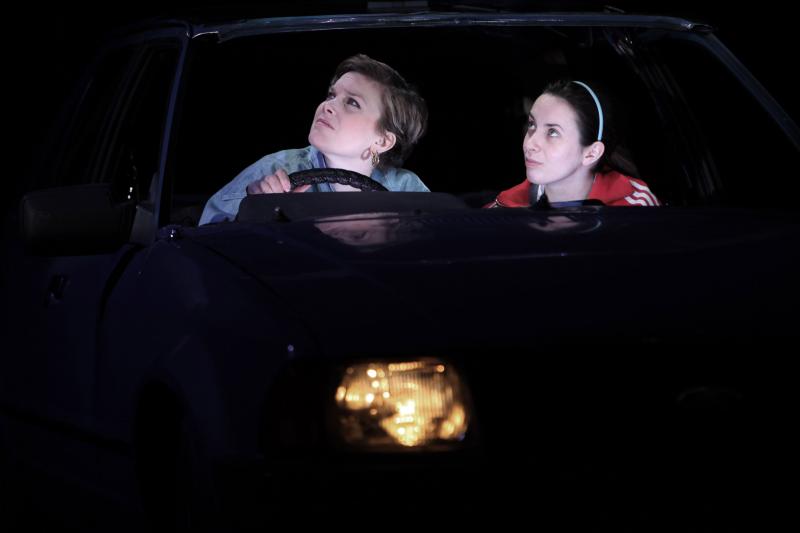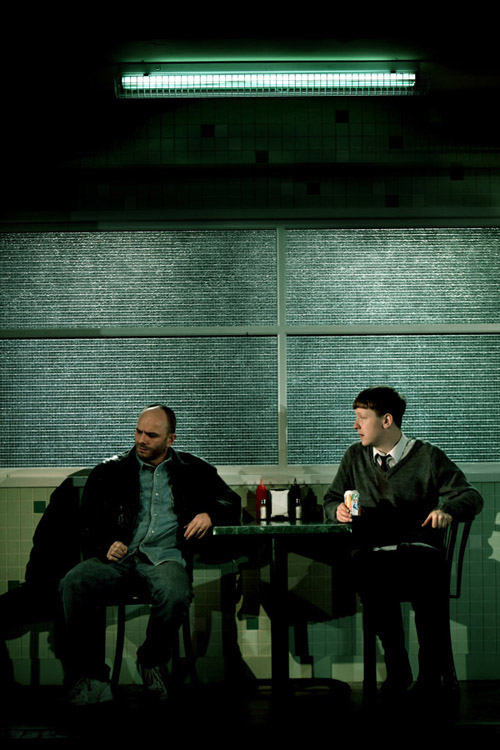Port, National Theatre | reviews, news & interviews
Port, National Theatre
Port, National Theatre
Dark revival of Simon Stephens’s depressing play about his hometown only occasionally brightened by humour

Over the past decade or so, Simon Stephens has emerged as one of Britain’s premier playwrights. As well as being a prolific penman, with three volumes of collected plays already in print, he has been tutor on the Royal Court’s Young Writers course and a regular at the National Theatre. He has also enjoyed collaborating with the best directors, one of whom is Marianne Elliott — their version of The Curious Incident of the Dog in the Night-Time transfers to the West End next month.
Set in Stockport, Elliott and Stephens’s hometown and a location he once called “one of the most hopelessly boring places in the north of England”, the story is a mini-epic of working-class life. The main character is Racheal Keats, who is only occasionally almost as poetic as her name implies, and we follow her from age 11 to age 24. She is the child of a deprived family, and we watch her pass the signposts of chav life: parental arguments, domestic violence, death of a grandparent, teenage sexual attraction, raising the deposit on a rented flat, young love and then disastrous marriage.
This urban jungle is a place of lost souls, and misery is handed down through the generations
At first, her younger brother Billy is merely annoying. But gradually he grows into a crazy tearaway, one of those feral kids so beloved of the tabloids. He steals; he runs amok; he gets caught; he is sent away. Yet the bond between the two holds firm, and each sibling helps the other. But the same can’t be said of their parents. As early as the first scene, when Racheal naively suggests to her mum that they run away — just mum and the two kids — she responds by saying that if she leaves, it will be on her own. It's grim.
Like an upended bag of stolen goods, out come tumbling all the themes and issues of the play. Almost immediately Port offers a sociology of bad parenting. The older generation is either absent or out of it; there’s neglect; there’s incomprehension; there’s incommunicability. Then threats, violence and abandonment. It’s a “what not to do” manual of parenthood. This urban jungle is a place of lost souls, and misery is handed down through the generations. The only solution is to get away.
Yet, at the same time, the character of Racheal, who is on stage for almost all of the evening, gradually grows on you. She has an appealing pluck and the way her mind works constantly surprises us. From the start, she is interested in the world. Despite the aches of the losses she experiences, her heart is steady and her eyes shine bright. And she admits her mistakes and is aware of her failings. Self-reliant, sometimes funny, and often grounded in a strong sense of right and wrong, she is the jewel that can occasionally be found in the gutter.
 And Stockport has a bleak awfulness in this acidic-neon portrait of urban deprivation and hopelessness. The literal poverty of the poor is matched by the poverty of their aspirations. It’s a dark vision of contemporary Britain and as relevant today as when it was first staged. Yet despite the horrors that spatter the text - perverts in the park, casual viciousness, drug and drink abuse, thieving and betrayal - this is also a strangely moving account of a resilient human spirit.
And Stockport has a bleak awfulness in this acidic-neon portrait of urban deprivation and hopelessness. The literal poverty of the poor is matched by the poverty of their aspirations. It’s a dark vision of contemporary Britain and as relevant today as when it was first staged. Yet despite the horrors that spatter the text - perverts in the park, casual viciousness, drug and drink abuse, thieving and betrayal - this is also a strangely moving account of a resilient human spirit.
Stephens’s style mixes a cool British noir sensibility with a redemptive humanism. His writing is always exact, and he writes lyrically about hope, honesty and humour, as well as brutality and despair. His dialogues are based firmly on emotional truth. If Elliott’s production sometimes feels as if it doesn’t quite fit on the huge Lyttelton stage, there are excellent performances from the really impressive Kate O’Flynn as Racheal, partly sassy and partly vulnerable, well supported by Jack Deam as Jonathan and Mike Noble as Billy (pictured above), as well as Calum Callaghan as boyfriend Danny and Liz White as mum. Deam and White also double as two other characters. But be warned: this is a gruelling and sad evening only occasionally enlightened by the weak rays of humour, or hope.
rating
Explore topics
Share this article
The future of Arts Journalism
You can stop theartsdesk.com closing!
We urgently need financing to survive. Our fundraising drive has thus far raised £49,000 but we need to reach £100,000 or we will be forced to close. Please contribute here: https://gofund.me/c3f6033d
And if you can forward this information to anyone who might assist, we’d be grateful.

Subscribe to theartsdesk.com
Thank you for continuing to read our work on theartsdesk.com. For unlimited access to every article in its entirety, including our archive of more than 15,000 pieces, we're asking for £5 per month or £40 per year. We feel it's a very good deal, and hope you do too.
To take a subscription now simply click here.
And if you're looking for that extra gift for a friend or family member, why not treat them to a theartsdesk.com gift subscription?
more Theatre
 Troilus and Cressida, Globe Theatre review - a 'problem play' with added problems
Raucous and carnivalesque, but also ugly and incomprehensible
Troilus and Cressida, Globe Theatre review - a 'problem play' with added problems
Raucous and carnivalesque, but also ugly and incomprehensible
 Clarkston, Trafalgar Theatre review - two lads on a road to nowhere
Netflix star, Joe Locke, is the selling point of a production that needs one
Clarkston, Trafalgar Theatre review - two lads on a road to nowhere
Netflix star, Joe Locke, is the selling point of a production that needs one
 Ghost Stories, Peacock Theatre review - spirited staging but short on scares
Impressive spectacle saves an ageing show in an unsuitable venue
Ghost Stories, Peacock Theatre review - spirited staging but short on scares
Impressive spectacle saves an ageing show in an unsuitable venue
 Hamlet, National Theatre review - turning tragedy to comedy is no joke
Hiran Abeyeskera’s childlike prince falls flat in a mixed production
Hamlet, National Theatre review - turning tragedy to comedy is no joke
Hiran Abeyeskera’s childlike prince falls flat in a mixed production
 Rohtko, Barbican review - postmodern meditation on fake and authentic art is less than the sum of its parts
Łukasz Twarkowski's production dazzles without illuminating
Rohtko, Barbican review - postmodern meditation on fake and authentic art is less than the sum of its parts
Łukasz Twarkowski's production dazzles without illuminating
 Lee, Park Theatre review - Lee Krasner looks back on her life as an artist
Informative and interesting, the play's format limits its potential
Lee, Park Theatre review - Lee Krasner looks back on her life as an artist
Informative and interesting, the play's format limits its potential
 Measure for Measure, RSC, Stratford review - 'problem play' has no problem with relevance
Shakespeare, in this adaptation, is at his most perceptive
Measure for Measure, RSC, Stratford review - 'problem play' has no problem with relevance
Shakespeare, in this adaptation, is at his most perceptive
 The Importance of Being Earnest, Noël Coward Theatre review - dazzling and delightful queer fest
West End transfer of National Theatre hit stars Stephen Fry and Olly Alexander
The Importance of Being Earnest, Noël Coward Theatre review - dazzling and delightful queer fest
West End transfer of National Theatre hit stars Stephen Fry and Olly Alexander
 Get Down Tonight, Charing Cross Theatre review - glitz and hits from the 70s
If you love the songs of KC and the Sunshine Band, Please Do Go!
Get Down Tonight, Charing Cross Theatre review - glitz and hits from the 70s
If you love the songs of KC and the Sunshine Band, Please Do Go!
 Punch, Apollo Theatre review - powerful play about the strength of redemption
James Graham's play transfixes the audience at every stage
Punch, Apollo Theatre review - powerful play about the strength of redemption
James Graham's play transfixes the audience at every stage
 The Billionaire Inside Your Head, Hampstead Theatre review - a map of a man with OCD
Will Lord's promising debut burdens a fine cast with too much dialogue
The Billionaire Inside Your Head, Hampstead Theatre review - a map of a man with OCD
Will Lord's promising debut burdens a fine cast with too much dialogue

Add comment